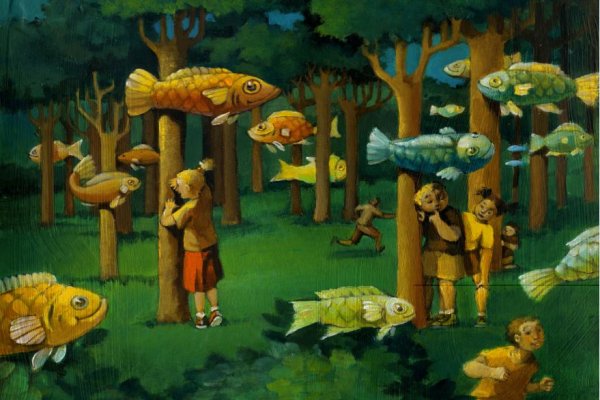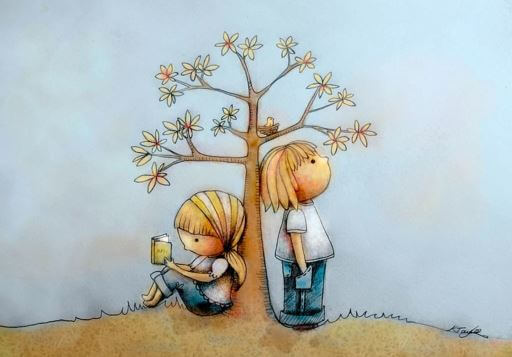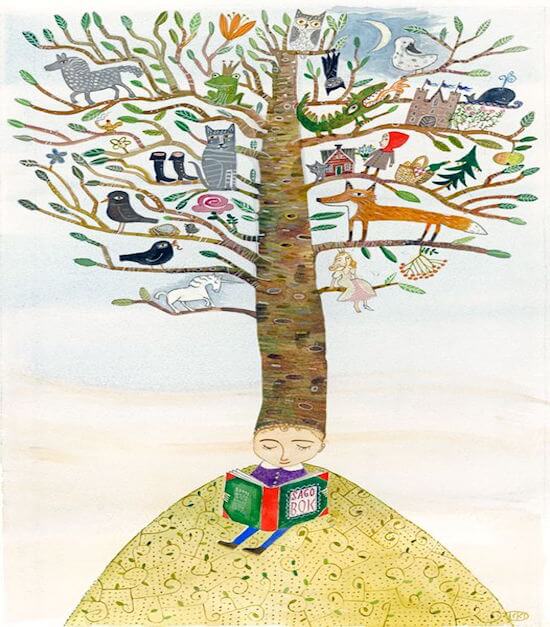Children Learn to Love Reading from Their Parents

Children learn to love reading from their parents. Sitting in their parents’ laps, they learn that opening the pages of a book can help them travel to new worlds full of different lives.
For children and adults, reading is the perfect activity for a free afternoon, and it will be available to you throughout your whole life. Moments full of entertainment and connection with the mind and heart.
Reading is a wonderful activity because it allows us to build bridges, to be pirates, villains, princes, queens, princesses, fairies, animals, and medieval heroes who save the world from disaster.

With a book, imagination and adventure are guaranteed
If children learn to travel into the world of a book, they’ll meet wonderful friends who will use their words to plant infinite stories in their minds. Reading offers them the possibility to live a thousand lives, to find themselves in the thoughts of various characters, and to make wonderful reflections.
A child who reads will become an adult who thinks, and with that, they’ll move away from habits that demand speed and comfort. This will allow them to enjoy the possibility of living a thousand lives and immerse themselves in a much more diverse world.
Being more aware and living amidst diversity will set them free and maximize their abilities, their potential, and their magic through words that allow them to dream.

Principles that foster a love of reading
Children must see their parents and people they admire reading. They learn to love reading in the laps of their parents. Here are a few tips:
- A passion for reading requires an eagerness for knowledge.
- Reading is an activity that requires contemplation, concentration, silence, privacy, and solitude.
- Reading also requires patience, since not all stories capture us from the beginning.
- Reading becomes more interesting when one’s environment values it as a good subject of conversation.
- Reading involves coming across complex feelings, contradictions, and the wonderful link between imagination and reality.
When a child is capable of anticipating all this when they’re about to read, it will become an extraordinarily appealing activity for them. Not only does it allow them to access written thought and narrative stories, but it can also give them the motivation to take the love of reading that others have expressed and make it their own. Because nobody who liked reading once stops liking it later.

Parents are the perfect link between their children and reading
Parents, for better or worse, are role models for their children. In their children’s eyes, they are heroes dressed in ordinary clothing who do extraordinary things. In fact, parents have to do something very bad for their children to not see them this way.
As such, they are capable of having more of an influence over their children than any other person. But, when they recognize this influence, what can they do to help their children read?
We’ll discuss a few ideas. The first one might be obvious, but that doesn’t make it any less important: reading in front of their children so they do it by imitation. It’s also good to read in public so that they understand that reading should never be a cause for embarrassment.
In addition, parents must put a book in their children’s hands. Not just the ones that they like, but ones with different topics so that the child discovers their own preferred genres. It’s not so much about getting them to read as it is getting them to like reading. Therefore, external rewards aren’t too advisable. If one must be used, the best is recognition.
Another important measure is creating a schedule for reading, a relaxed period of time in which children have no other desire than to discover what’s inside the book in front of them. To do so, parents can take them to the library for a while and talk to them about what they read on the way home.

However you do it, teaching a child to read means giving them abilities and resources for them to use in the future as a way to inform themselves, but also to have fun and do something they enjoy. It’s essential that children read more than just the books assigned at school, and know that there are thousands of stories waiting for them out there.
Reading isn’t just linking words to build a sentence, it’s being able to appropriate the text, making a story or a passage a part of oneself, choosing a book, using it for something, talking about the message, finishing it and expanding upon it. That is what it means to read.
Note that children can start to do all this by age 6 or 7. In the meantime, it’s advisable to clear their path as readers by filling them with stories and meanings, which will also help you retain enthusiasm for the magic found within children’s books. There is no doubt that reading is a pleasure that must become a habit, starting from a young age.
Children learn to love reading from their parents. Sitting in their parents’ laps, they learn that opening the pages of a book can help them travel to new worlds full of different lives.
For children and adults, reading is the perfect activity for a free afternoon, and it will be available to you throughout your whole life. Moments full of entertainment and connection with the mind and heart.
Reading is a wonderful activity because it allows us to build bridges, to be pirates, villains, princes, queens, princesses, fairies, animals, and medieval heroes who save the world from disaster.

With a book, imagination and adventure are guaranteed
If children learn to travel into the world of a book, they’ll meet wonderful friends who will use their words to plant infinite stories in their minds. Reading offers them the possibility to live a thousand lives, to find themselves in the thoughts of various characters, and to make wonderful reflections.
A child who reads will become an adult who thinks, and with that, they’ll move away from habits that demand speed and comfort. This will allow them to enjoy the possibility of living a thousand lives and immerse themselves in a much more diverse world.
Being more aware and living amidst diversity will set them free and maximize their abilities, their potential, and their magic through words that allow them to dream.

Principles that foster a love of reading
Children must see their parents and people they admire reading. They learn to love reading in the laps of their parents. Here are a few tips:
- A passion for reading requires an eagerness for knowledge.
- Reading is an activity that requires contemplation, concentration, silence, privacy, and solitude.
- Reading also requires patience, since not all stories capture us from the beginning.
- Reading becomes more interesting when one’s environment values it as a good subject of conversation.
- Reading involves coming across complex feelings, contradictions, and the wonderful link between imagination and reality.
When a child is capable of anticipating all this when they’re about to read, it will become an extraordinarily appealing activity for them. Not only does it allow them to access written thought and narrative stories, but it can also give them the motivation to take the love of reading that others have expressed and make it their own. Because nobody who liked reading once stops liking it later.

Parents are the perfect link between their children and reading
Parents, for better or worse, are role models for their children. In their children’s eyes, they are heroes dressed in ordinary clothing who do extraordinary things. In fact, parents have to do something very bad for their children to not see them this way.
As such, they are capable of having more of an influence over their children than any other person. But, when they recognize this influence, what can they do to help their children read?
We’ll discuss a few ideas. The first one might be obvious, but that doesn’t make it any less important: reading in front of their children so they do it by imitation. It’s also good to read in public so that they understand that reading should never be a cause for embarrassment.
In addition, parents must put a book in their children’s hands. Not just the ones that they like, but ones with different topics so that the child discovers their own preferred genres. It’s not so much about getting them to read as it is getting them to like reading. Therefore, external rewards aren’t too advisable. If one must be used, the best is recognition.
Another important measure is creating a schedule for reading, a relaxed period of time in which children have no other desire than to discover what’s inside the book in front of them. To do so, parents can take them to the library for a while and talk to them about what they read on the way home.

However you do it, teaching a child to read means giving them abilities and resources for them to use in the future as a way to inform themselves, but also to have fun and do something they enjoy. It’s essential that children read more than just the books assigned at school, and know that there are thousands of stories waiting for them out there.
Reading isn’t just linking words to build a sentence, it’s being able to appropriate the text, making a story or a passage a part of oneself, choosing a book, using it for something, talking about the message, finishing it and expanding upon it. That is what it means to read.
Note that children can start to do all this by age 6 or 7. In the meantime, it’s advisable to clear their path as readers by filling them with stories and meanings, which will also help you retain enthusiasm for the magic found within children’s books. There is no doubt that reading is a pleasure that must become a habit, starting from a young age.
This text is provided for informational purposes only and does not replace consultation with a professional. If in doubt, consult your specialist.







